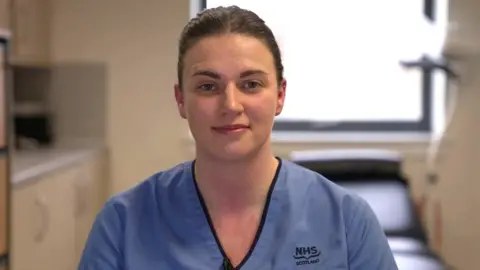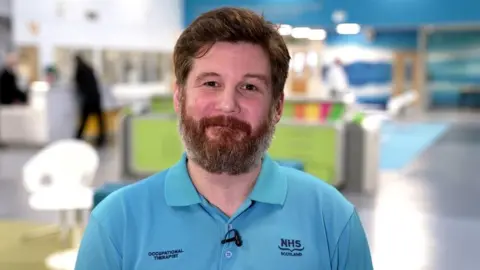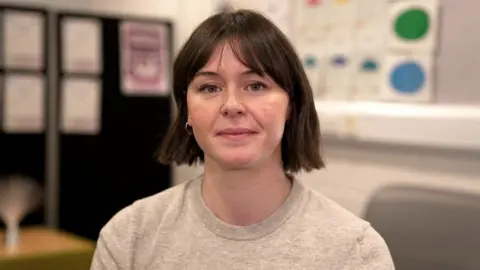'I'm a nurse in a prison but I've never felt unsafe'
 BBC
BBCWhen Eilish McBeth became a nurse she never dreamed she would end up working in a prison.
But for the 26-year-old from Clackmannanshire, it has become her dream job.
She walked through the prison gates of HMP Glenochill as a student nurse. Four years later she is a team lead with NHS Forth Valley looking after inmates with long-term health conditions.
She covers three jails - HMP Glenochil, HMP Polmont YOI and HMP Stirling.
She said: "There's a stigma around prison nursing. People think it might be dangerous, but I've never felt unsafe at my work. I feel like actually you can be more unsafe in other healthcare settings."
Showing us round the medical wing it looks like a typical GP setting.
There are five consultation rooms all set up in a similar way to your normal doctor or nurse's office with a desk for the medic, a chair for the patient and an examination bed, with a privacy curtain, in some rooms too.
The only difference here is no-one gets in or out without a Scottish Prison Service escort or a pre-booked appointment.
Cases are triaged in order of medical priority to ensure those most in need are seen first, just like community settings.
At HMP Polmont medical staff see between 40-50 patients each day.
Rising prison population
Eilish's role is one of 34 new jobs, across the prison health care sector, created by NHS Forth Valley in the last eight months as it tries to cope with the pressures caused by a rising prison population which has seen a steady increase since lockdown.
Despite having worked most of her nursing career in lockdown, Eilish says she can't imagine doing any other job in the health sector.
"The mixture of things you get to see on a daily basis is just exactly what I wanted to do. So as soon as it came to applying for jobs I applied straight to the prisons."
Eilish typically sees six to seven patients each day and is responsible for creating a care plan for each one who is referred to her with a chronic condition.
She said: "As much as people may have done crime, they are still vulnerable patients a lot of the time and it's really enjoyable to make a difference in their lives and hopefully change their outcomes."

NHS Forth Valley has more than 140 staff working on its medical team across three prisons in its remit.
One area that's seen the biggest rise in demand for support is mental health services.
It's not a free-for-all behind the prison walls though. Patients must still be referred, by a prison guard or social work partner, to the team.
Jon Henshall, 42, is a mental health occupational therapist. He joined the team from London after spending several years working at HMP Pentonville in Islington.
He's one of three mental health occupational therapists working in Forth Valley prisons.
While in prison, patients are more likely to spend extended periods indoors, which Jon says can sometimes heighten anxiety.
Loud noises or the escorted walk from one area to another through metal corridors with barbed wire can feel overwhelming to some inmates who need to attend therapy sessions.
So therapists like Jon need to factor this in when scheduling appointments to ensure patients still access care without feeling cut off.
'Misconceptions'
"I'll look to see between four and five people a day. We can come up to the halls. We can come up to really wherever we feel our patient feels they need that support," he said.
Jon can't imagine working in any other part of the health sector and thinks misconceptions around what prisons are like can cause people to be put off applying for vacancies.
"It's nothing like you see on TV," he says.
"There's a perception of what prison's going to be like. It's not like that. Yes it's challenging and you have difficult days, but for myself I'd say it's rewarding for the work that you put in and you can see health-positive changes in people," he said.
As well as a full primary health care team on site, specialist services are provided inside the prisons too.
There are just five speech and language therapists delivering in-house support across all prisons in Scotland - with the majority working in Forth Valley.

Jacqueline Smith joined the team three years ago and says the case load continues to grow.
"We have this statistic that up to 80% of prisoners can have speech and language and communication needs. So a big part of my role is staff training and working with the Scottish Prison Service staff to make sure everyone's is aware of those needs."
Her role aims to help patients communicate more clearly so they are able to open up more with prison staff as well as family and friends.
Sessions with therapists like Jacqueline can help patients communicate with their lawyers if they don't understand what is happening with their case.
We sit in on a session with one patient and see the use of flash cards with emojis to help prompt questions and thoughts around emotions.
Jacqueline said: "It's about making a difference for people who have may be had a lot of challenges in life.
"They're maybe in a place where they're able to access services, when they come here, that can help make things a bit easier for them in life."
